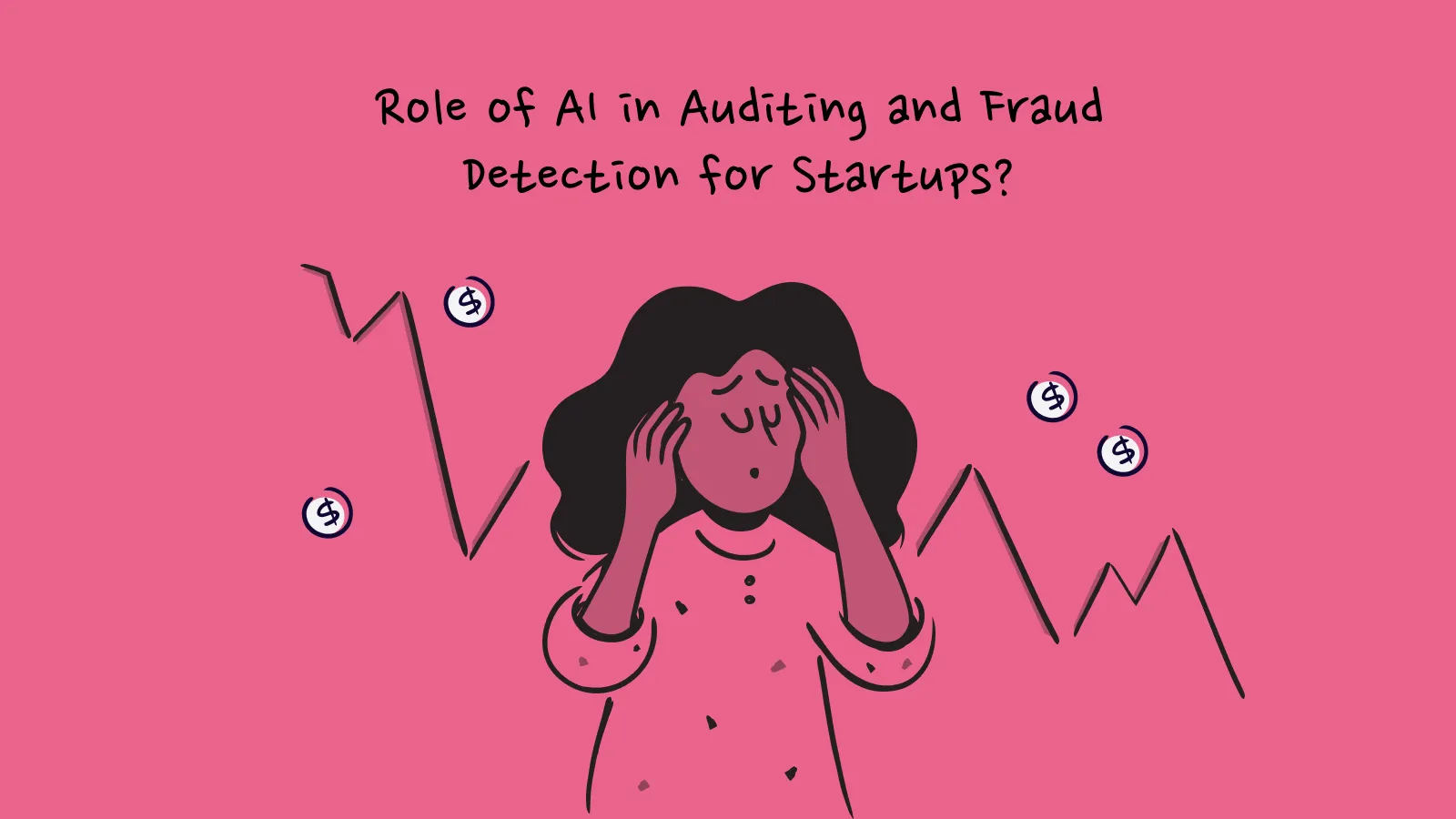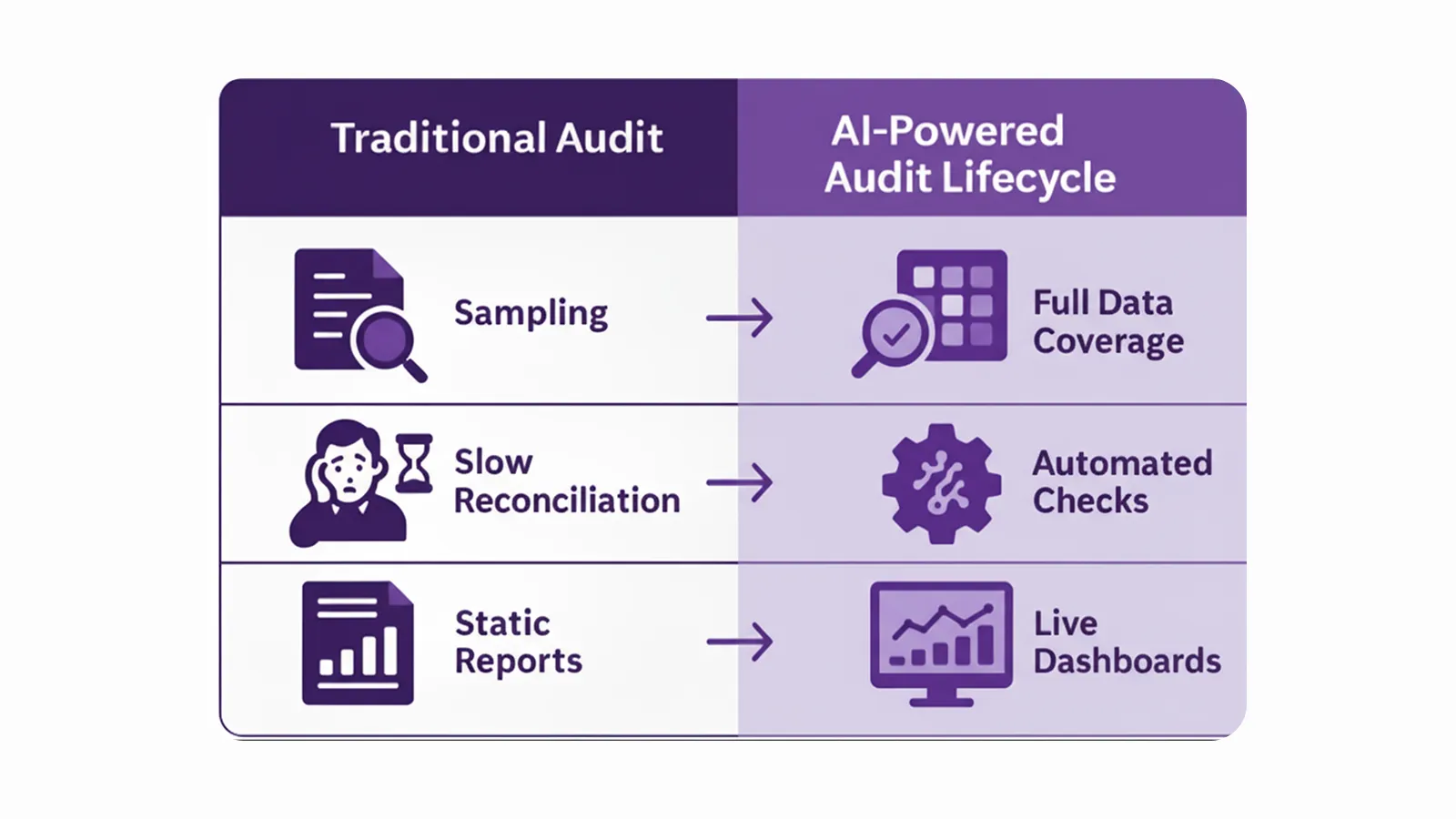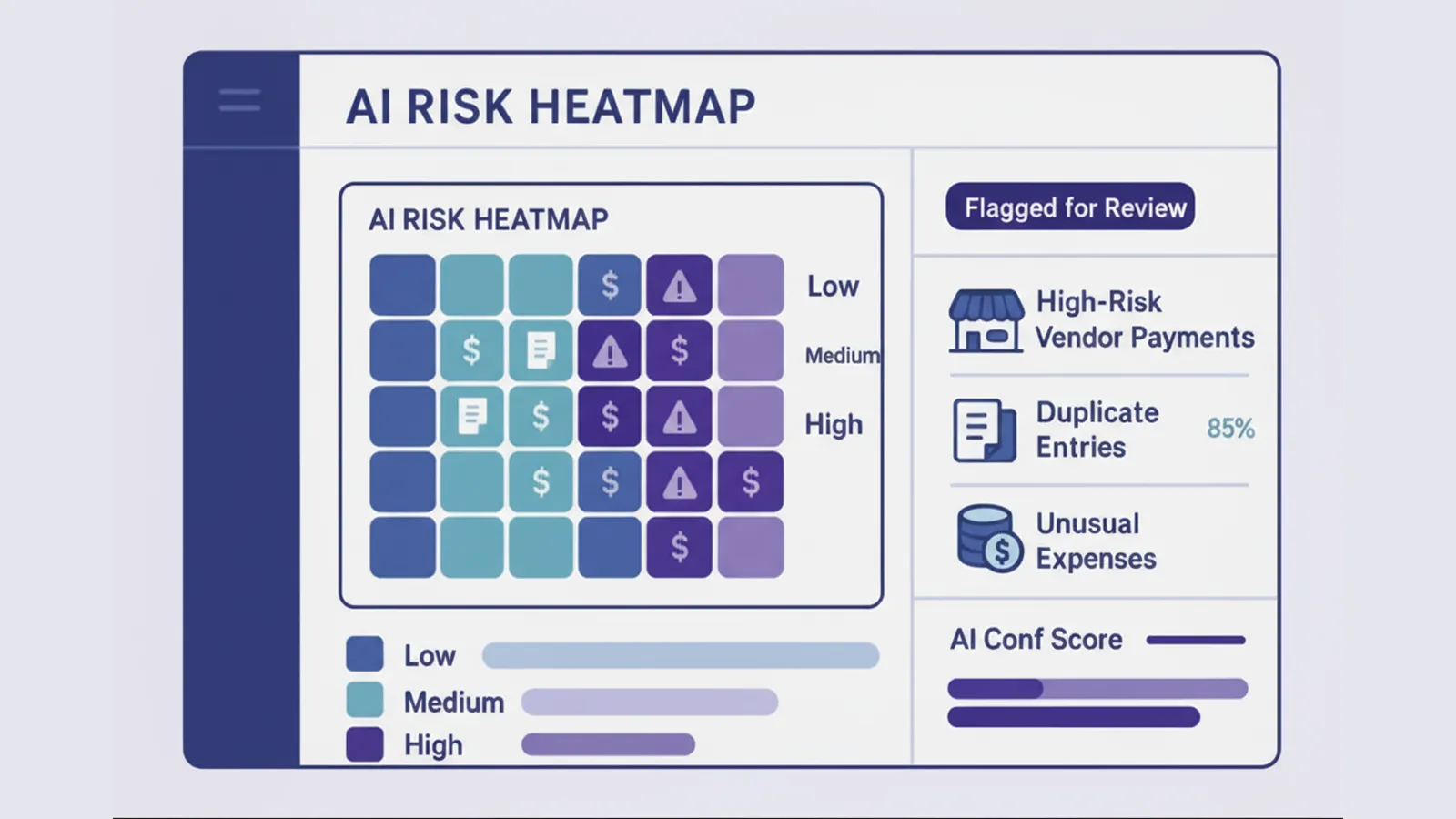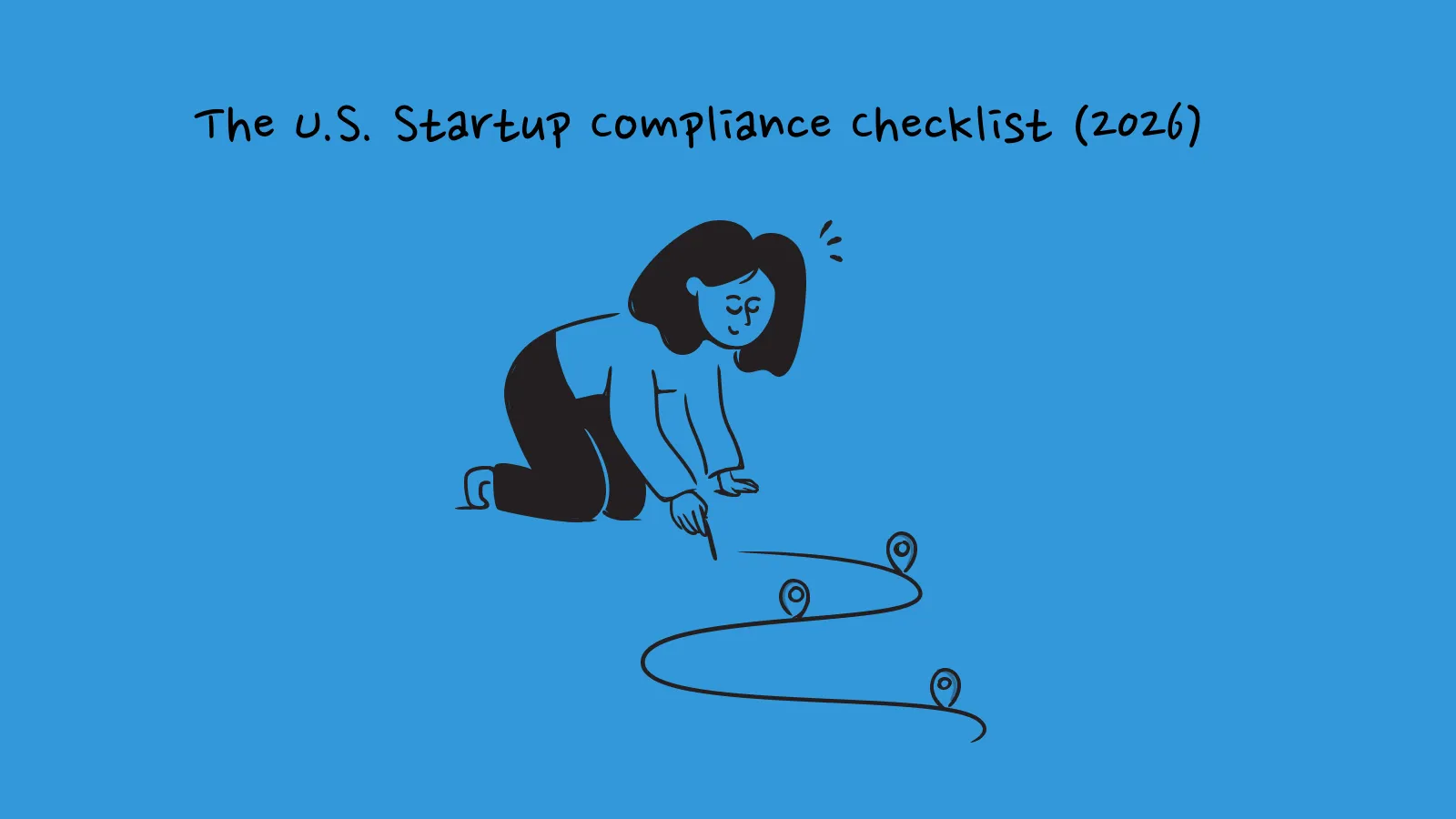Role of AI in Auditing and Fraud Detection for Startups?

For startups staying audit-ready and minimizing financial risk is crucial but difficult. Traditional audits and fraud checks are slow, expensive, and often rely on sampling small portions of data. It leaves gaps that can hide costly errors or even fraud.
AI is changing that.
With always-on monitoring, instant alerts, and analysis of every transaction, AI gives startups the ability to detect risks early, keep financial records clean, and have greater transparency in their operations. It’s about finding problems faster and building trust and financial discipline from the start.
How AI Changes the Way Startups Approach Audits
Audits no longer have to be slow, manual, or stressful. With AI, startups can automate repetitive audit tasks like data reconciliation, document matching, and record verification. Instead of spending hours gathering and organizing information, finance teams can focus on reviewing insights and addressing potential issues.

Most importantly, AI expands audit coverage from limited samples to 100% of the company’s transactions eliminating blind spots that traditional audits often miss.
Here’s how AI transforms startup audits:
- It reviews every financial transaction instead of small samples, ensuring complete accuracy and visibility.
- It flags inconsistencies or irregular entries automatically for review by your team or auditors.
- It reduces manual data preparation and repetitive audit tasks, cutting down on fatigue and time.
- It maintains clean, organized audit trails for faster, error-free reviews.
How AI Enables Real-Time, Continuous Fraud Detection
Fraud is one of those threats that often grows quietly hidden in recurring transactions, duplicate claims, or unusual spending habits. For startups, especially those scaling quickly with limited oversight, these small inconsistencies can add up fast.

AI changes the game by continuously analyzing every transaction, flagging anomalies instantly, and learning from past data to recognize even subtle risks:-
i) AI Detects Fraud the Moment It Happens
Unlike manual reviews that happen monthly or quarterly, AI systems monitor transactions in real time. They track every inflow and outflow including vendor payment, reimbursement, or subscription charge, and alert teams when something doesn’t fit the usual pattern. This means potential fraud is caught early, before it impacts cash flow or credibility.
ii) It Analyzes Patterns, Not Just Single Events
AI doesn’t just detect isolated errors; it identifies recurring patterns that might point to fraud. For example, it can connect duplicate expenses across departments or spot repeated small transfers to the same unverified account. Over time, it builds a financial “fingerprint” for your startup, so any activity that deviates from the norm stands out immediately.
iii) It Reads Between the Lines with NLP
Numbers tell one part of the story; documents tell another. With Natural Language Processing (NLP), AI can analyze invoices, contracts, and internal communications to detect inconsistencies or potential manipulations. For example, it can flag mismatched purchase orders or policy violations embedded in vendor documents that might go unnoticed manually.
Here’s how AI supports real-time fraud prevention:
- It monitors every transaction 24/7, ensuring constant financial oversight.
- It compares historical and real-time behavior to detect unusual trends and spending patterns.
- It flags potential insider threats, policy violations, and access anomalies.
- It detects document tampering or inconsistent claims before they escalate into fraud.
iv) From Detection to Prevention
AI’s greatest advantage lies in its ability to learn and adapt. Each time it flags an issue, it improves its understanding of your financial ecosystem making future detection faster and more accurate. For founders, this means moving from reactive fraud management to proactive prevention, where financial control is built into daily operations rather than added as a safeguard later.
How AI Prioritizes Risk and Keeps You Aligned with Compliance
Not all financial risks are equal. Some errors are harmless, while others can expose your startup to penalties, reputational loss, or even legal scrutiny.
AI helps founders focus on what truly matters by scoring and ranking risks based on their severity, frequency, and potential impact. This ensures teams spend time on the areas that actually need attention, instead of manually combing through every transaction.
i) Identify and Prioritize High-Risk Areas
AI continuously analyzes financial data to detect patterns that may signal elevated risk such as recurring policy breaches, vendor anomalies, or large unverified transactions. It then assigns a risk score to each issue, allowing founders and auditors to prioritize reviews effectively. This smart filtering helps small finance teams do more with less time, improving overall audit quality.
ii) Stay Compliant as Standards Evolve
Keeping up with shifting compliance regulations can be a full-time job, especially when operating across states or dealing with investor due diligence. AI simplifies this by automatically tracking rule changes, updating audit checklists, and maintaining digital documentation that meets recognized financial standards. This not only reduces compliance risk but also ensures readiness for audits or investor evaluations.
Here’s how AI strengthens risk and compliance management:
- It quantifies risk levels to guide smarter, data-driven audit reviews.
- It automatically tracks updates to audit and accounting standards across jurisdictions.
- It maintains consistent, traceable documentation aligned with compliance requirements.
iv) Build Confidence Through Continuous Oversight
With AI managing risk and compliance, startups move from reactive oversight to continuous assurance. Every transaction, report, and policy update feeds into an adaptive system that learns and refines over time. For founders, this means fewer surprises, stronger governance, and greater confidence when dealing with investors or regulators.
Benefits of Using AI for Audits and Fraud Prevention
For startups, AI makes audits more reliable, and far more scalable. Instead of chasing errors or reacting to problems, founders can maintain a continuous state of financial clarity. With automation handling reconciliation, anomaly detection, and documentation, startups save time, reduce risks, and stay investor-ready year-round.
AI brings enterprise-grade accuracy to startup operations without the enterprise price tag. It eliminates guesswork, ensures every transaction is validated, and delivers insights instantly. This means audit cycles that once took weeks can now be completed in days with cleaner data, fewer surprises, and full transparency for investors and auditors.
AI empowers startups to operate just like established enterprises, but without the cost or overhead. As your company grows, the same system scales effortlessly, managing more transactions, more complexity, and more regulations. What you gain is time, control, and confidence - the kind of foundation that attracts investors and sustains long-term growth.
How Inkle Helps Startups Monitor Risk and Stay Audit-Ready with AI
Staying compliant and audit-ready shouldn’t require a large finance team or sleepless nights. Inkle makes that possible with AI-powered tools designed specifically for startups.
From real-time fraud alerts to automated audit documentation, Inkle helps founders build financial transparency and control into daily operations instead of treating it as an afterthought.
i) With Inkle, Stay Ahead with Continuous AI-Powered Oversight
Inkle’s AI engine reviews every transaction across accounts, categorizes it correctly, and flags anomalies instantly. It provides complete data coverage, not just samples so that founders always have a clear view of their financial integrity. When it detects unusual entries or potential compliance gaps, it alerts teams in real time, helping prevent issues before they grow.
ii) Simplify Audit Preparation and Documentation
Preparing for an audit is no longer a last-minute scramble. Inkle automatically organizes and stores receipts, reconciliations, and transaction logs, creating a ready-to-share audit trail. This level of automation ensures startup teams can produce accurate, verifiable records whenever required.
Here’s how Inkle supports AI-driven audit readiness:
- It delivers AI-based audit support with 100% data coverage for complete accuracy.
- It provides real-time fraud alerts tied directly to financial transactions.
- It automates documentation and report generation for seamless audit preparation.
iii) Build Financial Trust and Save Time
With Inkle, founders can replace uncertainty with insight. Continuous monitoring means cleaner records, faster reporting, and stronger investor trust. Instead of worrying about compliance, you can focus on growth.
Ready to simplify audit and fraud management? Book a demo with Inkle and see how AI can help your startup stay compliant, confident, and investor-ready year-round.
Frequently Asked Questions
How does AI improve audit accuracy?
AI reviews every transaction instead of just small samples, ensuring complete data coverage. It applies consistent logic and pattern checks across all financial records, which reduces missed errors and creates cleaner, more reliable audit reports.
Can AI detect fraud in real time?
Yes. AI continuously monitors transactions, vendor activity, and account movements to flag unusual or suspicious behavior. This real-time detection helps teams act before fraudulent activity causes financial or reputational damage.
What types of financial fraud can AI help identify?
AI can spot duplicate expense claims, unauthorized transfers, insider misuse of funds, falsified vendor invoices, and inconsistencies in payroll or reimbursements. Over time, it learns from new data to recognize even complex or evolving fraud patterns.
How does AI help with audit preparation?
AI automates reconciliation, tagging, and document organization. It keeps a complete record of every financial transaction and supporting document, creating a structured audit trail that’s ready for internal reviews or external audits anytime.
Is AI more effective than traditional fraud detection methods?
Yes. Traditional methods rely on manual reviews or rigid rule-based systems, which often miss subtle fraud patterns. AI analyzes full datasets, learns continuously, and reduces false positives making detection faster, broader, and more accurate.




